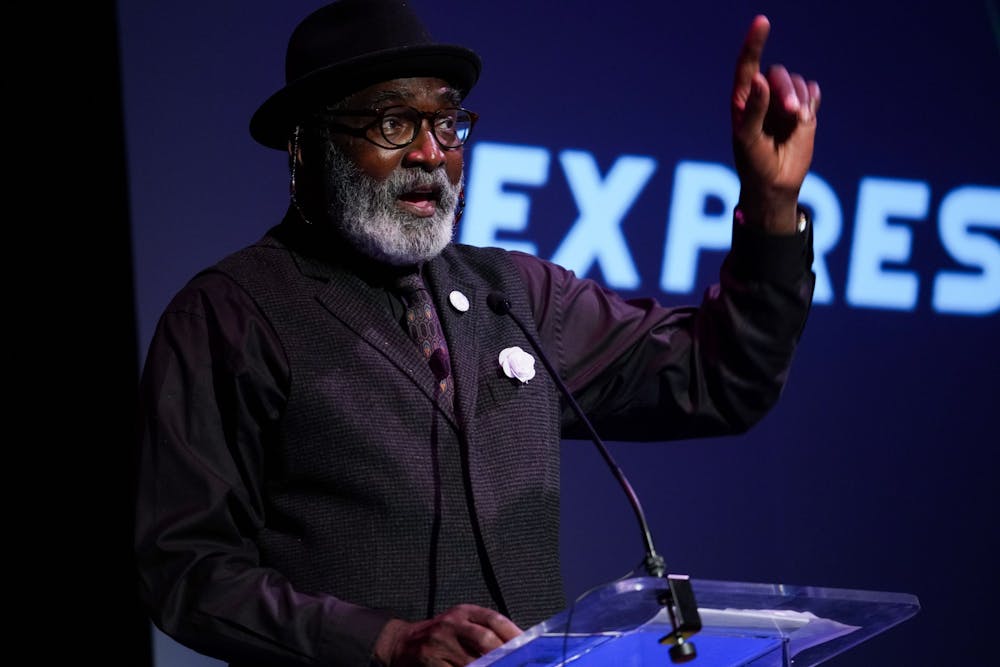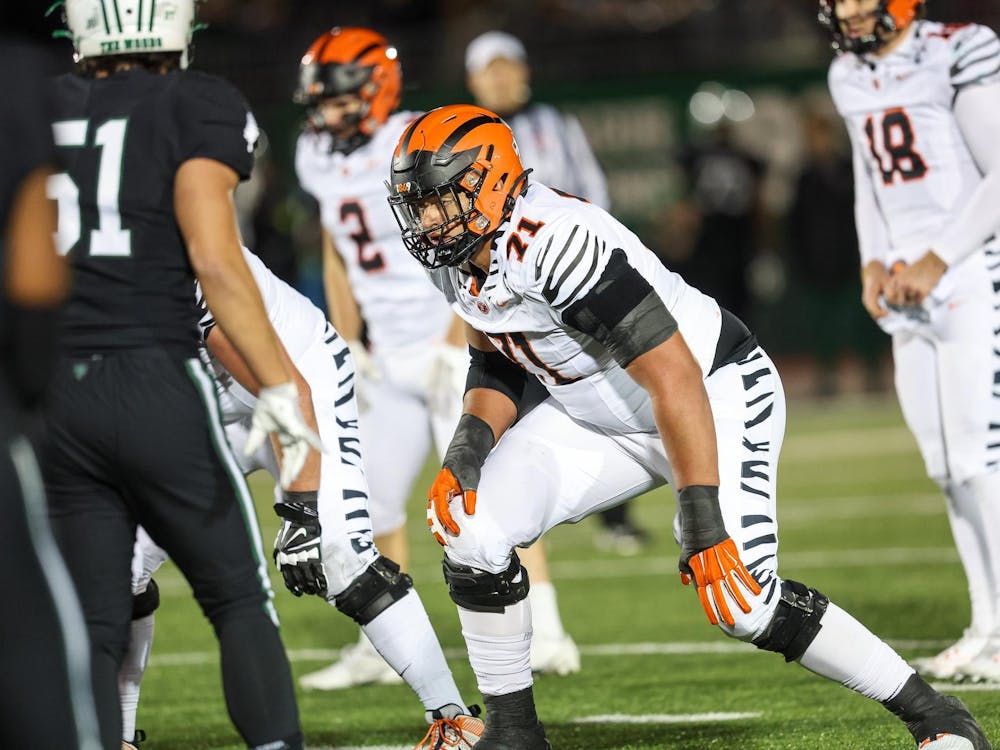On Sunday, Oct. 20, H. Alonzo Jennings GS ’72 was awarded the Expression Award for Radio at the third annual Cammy Awards, which commended his program, “Jazz from an Eclectic Mind.” The ceremony recognized several television and radio producers at PhillyCAM, a non-profit community media center in Philadelphia. The Daily Princetonian spoke with Jennings about the award, his show, and his passion for jazz.
The Daily Princetonian: Tell me about your love story with jazz. When did it start?
H. Alonzo Jennings: I have been in love with jazz, I think sometimes, as long as I can remember. I grew up with a single mom and spent time with my grandparents down in Georgia, and my uncle had a gospel group, and my mother loved gospel. She loved the blues ... in Georgia, back in the ’40s and the ’50s, you really didn't hear jazz.
About the only time you could hear it was at night from, I guess they would call it a superstation right now, broadcast out of Chicago, and they would play jazz tunes throughout the South. There [were] no local radio stations that broadcast jazz music … When I came north … that’s sort of when my love affair with jazz really began, when we came back north, and I was inundated with Count Basie and Duke Ellington … And I started buying records.
As soon as I could, you know, I mean, I would pass up lunch to buy a jazz album, and we shared them. There were a couple of friends of mine who were more knowledgeable. I didn't play, but they played, a lot of them played ... So that's where my, my love came from.
And it’s only grown the older I’ve gotten. [I] appreciate that I was alive, you know, when Coltrane was alive and Clifford Brown was alive, you know, and all or some of the greats who have passed like Art Blakey and so forth, to have heard them ... So, it’s been a long affair.
DP: It sounds like you grew up in a few different places, but how would you describe the community that you grew up in?
HAJ: I guess that would be Patterson. Patterson, New Jersey … My mom took me south, I guess, when I was about three or four, and I stayed there until I think the second grade. But when I was in Patterson, well, two things happened when I came north from the south. They automatically would take black folks and put them back a year. So I was, I came at the midterms, I was put back almost two years … The assumption was that the schools were inferior; there was no testing or anything like that.
You just, you know, you just [were] put back. And Patterson was a great environment because I was surrounded by thousands of people [who] had migrated in the late ’40s and early ’50s … The neighborhood that I grew up in Patterson, it was a poor neighborhood, but it was an integrated neighborhood … and the thing that we all had in common is we didn't have anything. We were all poor.
If you lived in this building, if you lived in that neighborhood, you were poor, but we had libraries. And I lived across the street from a school … and my mother only had a third grade education, but she knew that I needed more, and she did everything she could to make sure that I got a good education, that I got good grades, and then also preparing myself to work.
I mean, she never thought of college. I was the first person in my family to graduate high school, so college was never even a thought … And I grew up with this passion for the music and for poetry and a few other things, like history. And that’s, I guess, how I arrived at Princeton.
DP: Congratulations on your award! How does this award reflect the way that you envision and create your radio program?

HAJ: My show is called “Jazz from an Eclectic Mind.” And because of my upbringing — the blues, gospel, jazz — the family that my mother worked for, the Burrs, were very generous to us. And so not only did I have coloring books and fans, because they had two daughters ... they also gave us an old record player and they gave us records and so forth that they had gotten tired of.
So, I grew up listening to Perry Como … and comedy albums and things like that, and a good dose of classical music. Bach and Beethoven — Stravinsky was my favorite above all. So I grew up not only listening to jazz, but also listening to classical music, folk music, and, because of my living in the South for so long, I grew up with a very healthy appreciation of bluegrass and country music …
And I started collecting albums, I guess I got five or six thousand albums here, it's a very eclectic collection … When the station was starting, when they were branching off, and including a radio along with the TV station, they asked a guy that I grew up with to do a show … He said, “Why don't you come on? I’ll give you 15, 20 minutes and you come on to play some music.” ... That's how I started.
And I did that for about six months, and they liked what I did, and they gave me my own show. And again, it’s “Jazz from an Eclectic Mind,” because I try to include all of my taste. I see jazz in everything … The reason the show is so enjoyable to me is I play my own music.
No one tells me what to play — I only play music that I own. I do interviews of people that are carrying on the tradition of jazz and then those young people who are radical, who are taking it to another level … So that’s, that’s what it does. It’s very fulfilling, and I don't get paid. It’s a passion.
DP: What are you listening to right now? Who are your top artists at the moment?
HAJ: A constant in my life since 1960 has been John Coltrane. I listen to John Coltrane all the time ... right now Kurt Elling is my favorite jazz singer ... There’s Esperanza Spalding, a young female bass player, who is extraordinary … The Julian Hartwell project, a young white dude out of Philadelphia … Branford Marsalis in particular, but his drummer Justin Faulkner …
Philadelphia is one of the great jazz cities in the world. It’s smaller than New York, I think smaller than Boston, smaller than Paris, but it is filled with neighborhoods that offer music in the synagogues, music in churches, music in neighborhood centers, music in the summertime on the streets. Every park in Philadelphia has its own small jazz festival.
These young kids get a chance to come in and play surrounded by the masters … My wife and I are out sometimes three or four nights a week listening to some kid [who’s] 12 years old that’s, like, blowing the socks off of a saxophone or trumpet …
In this radio station, I get these folks on and I expose them … I have listeners all over the country, you know, I get emails and likes on Facebook and whatnot from people in California and Louisiana that listen to the show. It’s not a lot, but you know, even if there’s only one I’ll give them everything I have.
DP: Is there anything else that you would like to include?
HAJ: The only thing I can say is I've been blessed to have a wife [who] has been with me for, Jesus, when did we get married? … 1971, I think it is. And she traveled, you know, with me, to, you know, we lived in Africa for a couple of years in Nigeria and Ethiopia. And what has happened is ... there’s certain things in my life that I have not had to worry about because I always knew that she was there …
As an employee of the radio station, quite often I’ll go to a venue and they’ll go, “Oh, why don’t you just come on in?” because I had my press pass, but I always pay my own way … This way I feel free and unencumbered to write what I want to write.
But beyond that … all of these organizations need support and they need people buying tickets. You know, they need people, the musicians need people buying CDs. And musicians need people to spread the word and bring friends to come and engage them and hear play. And so that's why I pay my own way. And it’s just what I, you know, part of what I do … It’s a simple life.








